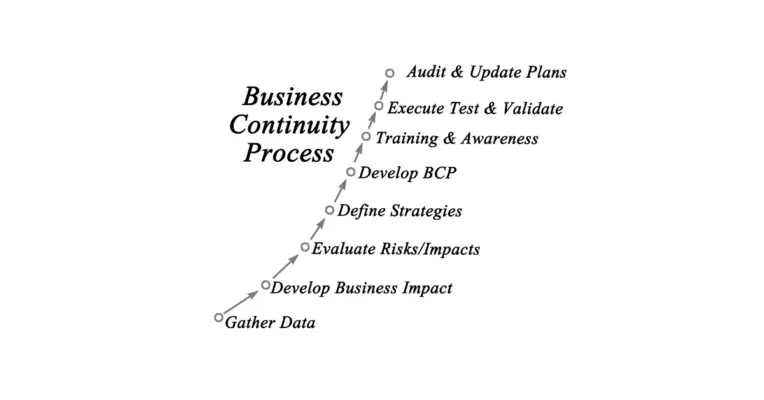Business continuity is the term used to describe an organization’s ability to keep functioning during and after an emergency or major disruptive event. The main purpose of business continuity is to protect an organization’s critical operations, assets, and personnel so that it can continue to function when faced with a major disruptive event.
What’s a business continuity plan, it includes ensuring that essential functions can be quickly resumed following an interruption and that any damage to property is minimized. To achieve this, businesses need to have systems and processes in place to identify and manage risk, as well as plan for how they will maintain operations during and after a disruption.
This step enables businesses to minimize the impact of a major disruptive event and ensure that they are able to quickly resume critical operations. This brings forth the importance of business continuity management to organizations.
A disruptive event is an unforeseen or unplanned event that interrupts the normal flow of operations. Disruptive events can range from small disturbances, such as a power outage, to large-scale disasters, such as a hurricane. The impact of a disruptive event can be catastrophic, causing extensive damage to property and infrastructure, and leading to loss of life. In the aftermath of a disruptive event, it is important to have a plan in place for how to respond.
This may include evacuating the area, providing medical assistance, and restoring essential services. Importance of business continuity being prepared for a disruptive event, It can help to minimize the impact and ensure that recovery is as swift and smooth as possible.
There are a number of reasons why businesses invest in continuity planning. Here are some of the most important ones:
- To ensure that the business can continue to operate in the event of an interruption, such as a natural disaster or other catastrophic events.
- To minimize the disruption to customers, suppliers, and other key stakeholders.
- To protect the company’s reputation and brand.
- To safeguard critical data and records.
- To ensure compliance with regulations.
Ensures Business Continuity in the event of an Interruption
Any business can be interrupted by an unforeseen event such as a natural disaster, power outage, or equipment failure. While the interruption itself may be out of your control, how you respond to it can make all the difference.
Having a well-developed continuity plan helps ensure that your business can weather any storm and come out unscathed on the other side. In taking steps to identify potential risks and develop contingency plans, Organizations can keep their business up and running no matter what happens.
In today’s world, a well-executed business continuity plan is essential for any business that wants to stay afloat in the face of adversity. Disasters large and small have the potential to disrupt operations, damage critical infrastructure, and cause customer dissatisfaction.
A comprehensive continuity plan helps to ensure that a business can effectively respond to disruptions, minimize downtime, and resume operations as quickly as possible. The key elements of a successful continuity plan include identifying potential threats, assessing risks, developing response strategies, and establishing clear lines of communication.

Minimize Disruptions to Customers, Suppliers, and other Key Stakeholders.
Businesses inevitably go through changes, whether it’s a change in ownership, a shift in strategy, or even just a move to a new office space. However, it’s important to minimize the disruptions that these changes can cause to customers, suppliers, and other key stakeholders.
In the case of a move, for example, businesses should provide clear and concise directions to their new location, as well as make sure that any contact information that has changed is updated on their website and other channels.
They should also provide ample notice to suppliers and other partners so that they can make any necessary adjustments to their own operations.
In any business, it is important to maintain positive relationships with customers, suppliers, and other key stakeholders. This can be difficult when disruptions occur, but there are some steps that businesses can take to minimize the impact.
First, it is important to have a clear plan for dealing with disruptions. This should include contingencies for alternate suppliers and communication plans for keeping stakeholders informed. In addition, businesses should strive to be as transparent as possible about the disruption and its potential effects.
Any business change has the potential to disrupt the status quo and upset the delicate balance that exists between a company and its key stakeholders. Therefore, it is essential to minimize disruptions whenever possible.
One way to do this is to clearly communicate the reasons for the change and its expected benefits. This will help to ensure that customers, suppliers, and other stakeholders are on board with the changes and are less likely to be disrupted by them.
In addition, it is important to implement changes gradually whenever possible. This gives everyone time to adjust to the new reality and minimizes the risk of disruptions. By taking these steps, businesses can minimize the disruptions that accompany any change.
Protect the Company’s Reputation and Brand.
One of the most important assets of any company is its reputation. A strong reputation can attract customers and help to build brand equity. Conversely, a negative reputation can deter customers and damage the company’s bottom line.
That’s why it’s essential for businesses to take steps to protect their reputation. One way to do this is to proactively manage the company’s online presence. This includes monitoring social media and responding quickly to any negative reviews or comments.
Additionally, businesses should make sure that their customer service is up to standard and that they are actively addressing any complaints.
A company’s reputation and brand are its most valuable assets. A strong reputation can attract new customers and help to retain existing ones, while a weak reputation can drive customers away. A business continuity plan ensures customers remain in the business.
Therefore, it is essential for businesses to take steps to protect their reputation and brand. This can be done in a number of ways, such as actively managing social media presence, monitoring online reviews, and responding quickly to negative feedback.
In addition, companies should make sure that their branding is consistent across all channels, from their website to their social media accounts.
Safeguard Critical Data and Records
The loss or destruction of critical data and records can have a devastating impact on any business operations large or small. Safeguarding these important assets should be a top priority for any organization.
There are many ways to protect data and records, including physical security measures like locks and alarms, as well as digital security measures like encryption and password protection.
Additionally, it is important to have robust backup systems in place so that if the worst does happen, you can quickly and easily recover your lost data. By taking steps to safeguard your critical data and records, you can help ensure that your business can continue to thrive in the face of any disaster.
Any organization that relies on data to do business faces the risk of data loss. Whether it’s customer information, financial records, or proprietary knowledge, data loss can have a devastating impact on an organization’s bottom line.
Fortunately, there are a number of steps that organizations can take to safeguard their data and records. One of the most important is to create regular backups. By storing copies of critical data off-site, organizations can ensure that they will be able to recover from even the most catastrophic events.,
Organizations should consider encrypting their data to protect it from unauthorized access through disaster recovery initiatives. In taking these simple steps, organizations can help ensure that their data is always safe and secure.

Compliance with Regulations
Business continuity planning is essential for all businesses, small and large alike. Not only can a well-developed plan help to keep your business operational during an unexpected event, but it can also help to ensure compliance with regulations.
Federal and state agencies are increasingly mandating that businesses have a plan in place to deal with disruptions, and a failure to comply can result in significant fines. In addition, business continuity planning ensures many insurers now require proof of business continuity planning in order to provide coverage.
Organizations need to take the time to develop a comprehensive plan, they can protect an organization from both financial and legal risks. Regulations are constantly changing, and without a plan in place, an organization may be vulnerable to lawsuits or fines.
Business continuity plansshould include specific steps to follow in the event of a data breach, as well as protocols for responding to other emergencies. An important part of any plan is training employees on how to respond. Employees need to be familiar with the plan, and know where to find information when they need it.
Regular testing of the business continuity plans is also essential. Tests should be conducted in a variety of scenarios so that employees are prepared for anything.
It is also important to have a clear chain of command in place. In the event of an emergency, it is crucial that everyone knows who is in charge and what their role is. A well-organized plan will help to ensure that things run smoothly in a crisis.
Conclusion
As we’ve seen, there are many reasons why businesses should implement a business continuity plan. By ensuring that your company can continue to operate in the event of an interruption, you minimize the disruption to customers, suppliers, and other key stakeholders. You also protect the company’s reputation and brand. Most importantly, you safeguard critical data and records.
In conclusion, business continuity is essential for any company looking to protect its operations, customers, and reputation in the event of an interruption. By following the tips we’ve outlined in this post, you can ensure that your business is well-prepared for any potential disaster. Have you created a business continuity plan yet? If not, now is the time to do so!

Chris Ekai is a Risk Management expert with over 10 years of experience in the field. He has a Master’s(MSc) degree in Risk Management from University of Portsmouth and is a CPA and Finance professional. He currently works as a Content Manager at Risk Publishing, writing about Enterprise Risk Management, Business Continuity Management and Project Management.

